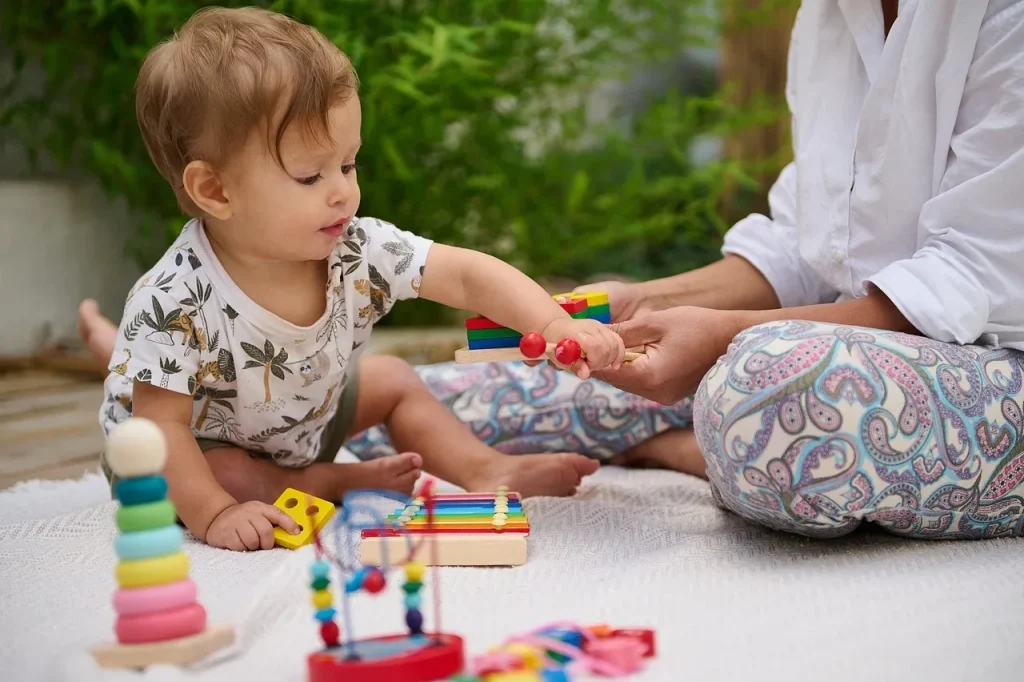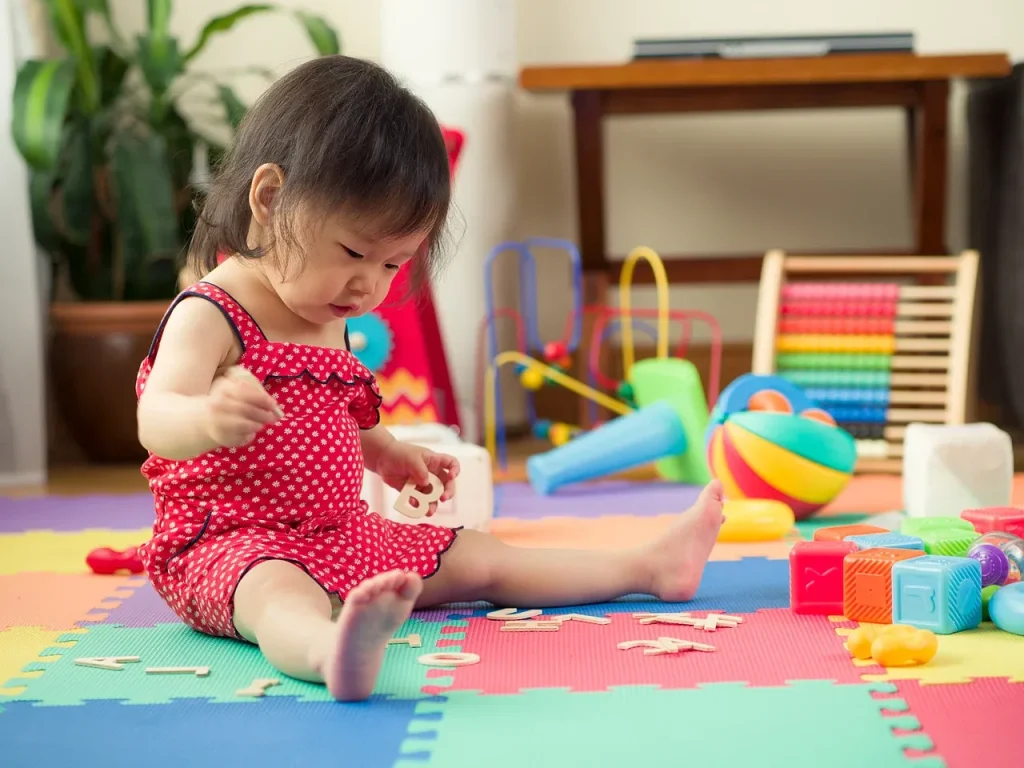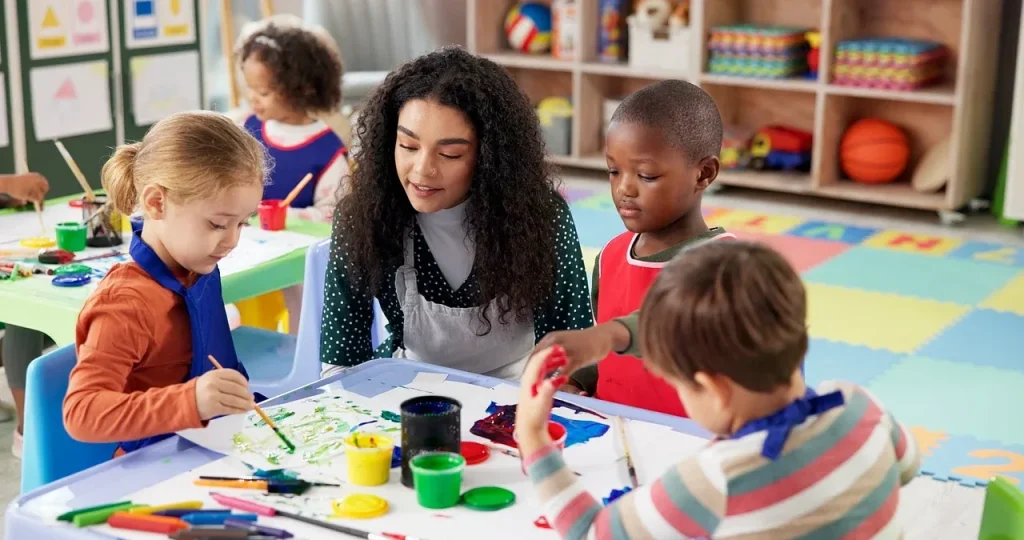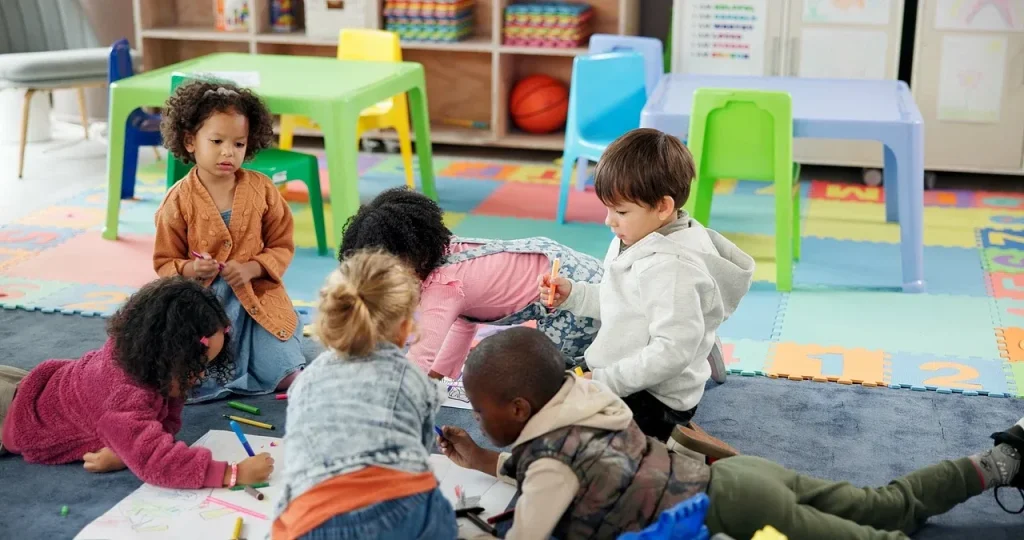Early Childhood Education is very important. Parents today understand that the earliest years of a child’s life play a critical role in shaping their future learning, confidence, and social development. At DeeCyDa, our mission is to go beyond basic childcare and create an educational environment where children build essential skills for preschool and for life beyond the classroom. With a curriculum rooted in early childhood education best practices, DeeCyDa provides the nurturing, structured foundation kids need to thrive academically, socially, and emotionally.
Early childhood education is more than preparing children for preschool—it is about building the holistic development of young children during their most formative years. With the guidance of qualified early childhood educators, children develop essential skills that support lifelong learning, social growth, and emotional resilience. In Canada, the field of early childhood education is governed by rigorous standards, academic programs, and professional expectations that ensure children receive the highest quality care and education in every setting.
Contents
- 1 What is The Role of Early Childhood Educators?
- 2 Education Pathways and Admission Requirements
- 3 Field of Study: What You Will Learn
- 4 Professional Standards and Certification
- 5 Career Options in Early Childhood Education
- 6 Supporting the Education of Young Children: A Shared Responsibility
- 7 Building Strong Foundations in Early Childhood Education
- 8 Preparing for Preschool Success
- 9 Beyond Preschool: Lifelong Benefits
- 10 Why Parents Choose DeeCyDa
- 11 A Parent’s Guide: When to Start Early Childhood Education
- 12 FAQs: Early Childhood Education at DeeCyDa
- 13 Conclusion: Investing in Your Child’s Future
What is The Role of Early Childhood Educators?
Registered Early Childhood Educators (RECEs) play a vital role in shaping the overall development and learning environment of children. Through their knowledge of human development, developmental psychology, and curriculum design, they create age-appropriate programs that address the needs of children across different care settings.
Educators also support children with special needs, focusing on language development, child health, and mental health while collaborating with community partners and families. Members of the College of Early Childhood Educators uphold the standards of practice set by the Ministry of Education and the Government of Canada, ensuring accountability, professionalism, and ethical care for all children.
Education Pathways and Admission Requirements
For individuals aspiring to work in the field of early childhood education, the academic journey begins with meeting admission requirements. These often include a secondary school diploma or high school diploma, particularly from an Ontario secondary school or equivalent international qualification.
Additional requirements may involve health checks, immunizations, and police clearance to work in childcare settings. For international students, proof of English or French proficiency and eligibility to study in Canada are also part of the admission requirements.
Many colleges and universities offer diplomas, degrees, or an attestation of collegial studies in early childhood care or child studies. Students gain both theoretical and practical experience through field placement, supervised by an academic advisor and supported by experienced mentors.
Field of Study: What You Will Learn
Programs in early childhood education combine theory with practical experience to prepare students for diverse career options. Core areas of study include:
- Child Development and Developmental Psychology: Understanding the early years and the development of children from birth to school age.
- Curriculum Design and Early Learning Programs: Creating play-based, inclusive learning tailored to primary education standards.
- Child Health and Mental Health: Promoting wellness and resilience in young children.
- Special Education: Addressing the needs of children with special needs in both inclusive and specialized education services.
- Field Placement and Practical Training: Working in childcare settings, schools, and community programs to apply theory to practice.
Students also learn about government regulations, program availability, and professional frameworks such as the national association for the education of young children (NAEYC).
Professional Standards and Certification
Becoming a registered early childhood educator requires not only education but also recognition by the College of Early Childhood Educators in Ontario or equivalent provincial bodies. Members of the College of Early Childhood Educators must follow the Code of Ethics and standards of practice, ensuring high-quality education services across all care settings.
The Government of Canada and the Ministry of Education outline eligibility requirements for professionals to work in this regulated field. These include completing recognized training, fulfilling additional requirements like background checks, and often accumulating years of experience in the field of early childhood education.
Career Options in Early Childhood Education
Graduates of early childhood development programs find opportunities across a wide range of education services and care settings, including:
- Licensed child care centers and childcare settings
- Preschools, kindergartens, and early learning programs
- Community-based child and family resource centers
- Programs supporting special needs and special education
- Policy, advocacy, and leadership roles with the Ministry of Education or community partners
- Higher education pathways into secondary education, primary education, or advanced child studies
With years of experience and advanced training, educators can also move into leadership, management, or policy roles that influence the future direction of the field of study.
The education of young children requires collaboration between families, educators, schools, and policymakers. By investing in strong early learning programs, societies nurture the holistic development of children, preparing them not only for secondary school and high school but also for lifelong learning and personal success.
Parents, educators, and international students entering the field all contribute to creating environments where children can thrive from their earliest years of age. At its core, early childhood education is about recognizing the uniqueness of every child and designing learning environments that meet the needs of children while fostering joy, curiosity, and resilience.
Building Strong Foundations in Early Childhood Education
At DeeCyDa, early learning is not just about ABCs and 123s—it’s about giving children the tools to succeed in every aspect of development. Our curriculum integrates:
- Cognitive Development: Through guided play, hands-on exploration, and structured learning, children learn problem-solving, early literacy, and mathematical concepts that prepare them for preschool.
- Social and Emotional Growth: Daily activities encourage teamwork, self-expression, empathy, and resilience—skills that carry children confidently into school settings and life.
- Motor Skills: From fine motor activities like art and puzzles to large motor play in outdoor spaces, children develop physical strength and coordination.
- Creative Expression: Music, art, and storytelling allow young learners to explore creativity and build imagination while reinforcing communication skills.
Preparing for Preschool Success
Many parents worry about the transition from home or daycare into a structured preschool environment. DeeCyDa bridges this gap with intentional preparation:
- Classroom Routines: Children learn to follow structured daily routines, which helps reduce anxiety when entering preschool classrooms.
- Independence and Self-Help Skills: Encouraging children to tidy up, share responsibilities, and manage basic tasks builds self-confidence.
- Early Literacy and Numeracy: Introducing letters, phonics, counting, and patterns ensures children enter preschool with the building blocks of academic success.
- Positive Peer Relationships: Group activities foster cooperation and communication, making preschool transitions smoother.
Beyond Preschool: Lifelong Benefits
The impact of early childhood education doesn’t stop at preschool—it shapes a child’s readiness for life. At DeeCyDa, children gain:
- Confidence in Learning: Kids who begin education early are more likely to embrace new challenges and stay motivated throughout school.
- Resilience and Adaptability: By practicing problem-solving and flexible thinking, they adapt better to changing environments.
- Strong Communication Skills: Early practice with language, listening, and expression creates effective communicators in both academic and social settings.
- Love for Learning: Our play-based and discovery-driven model encourages children to see learning as exciting, not intimidating.
Why Parents Choose DeeCyDa
Parents in Irvine and the surrounding areas trust DeeCyDa because we provide more than just early learning—we offer a safe, nurturing environment supported by experienced educators. Key reasons families choose us include:
- Qualified Educators: Our teachers specialize in child development and create personalized learning experiences for each child.
- Safe & Stimulating Environment: Bright classrooms and interactive spaces encourage exploration while ensuring safety.
- Family-Centered Approach: We partner with parents through regular communication, progress reports, and family events.
- Community Connection: As part of a thriving community in Irvine, we emphasize collaboration, diversity, and inclusivity.
A Parent’s Guide: When to Start Early Childhood Education
One of the most common questions parents ask is: When should I enroll my child in an early childhood program? Experts recommend starting as early as ages 2–3, when children are most receptive to new experiences and rapid brain development. By beginning at DeeCyDa, children are not only better prepared for preschool but also more likely to excel in kindergarten and beyond.
FAQs: Early Childhood Education at DeeCyDa
Q: What age should my child start early childhood education?
A: DeeCyDa accepts children as young as two, offering age-appropriate programs designed to match developmental stages.
Q: How does DeeCyDa prepare kids differently from other centers?
A: Our holistic approach combines academics, emotional intelligence, creativity, and independence training, ensuring balanced growth.
Q: Will my child be ready for kindergarten after DeeCyDa?
A: Yes. Children leave DeeCyDa with early literacy, numeracy, and social skills that put them ahead when entering formal school systems.
Conclusion: Investing in Your Child’s Future
Choosing the right early childhood education program can make all the difference in your child’s future success. DeeCyDa is more than a preschool prep center—it’s a place where children grow into confident, curious learners ready to take on new challenges. By enrolling at DeeCyDa, you are giving your child the gift of a strong foundation, lifelong learning skills, and the confidence to thrive in preschool and beyond.
